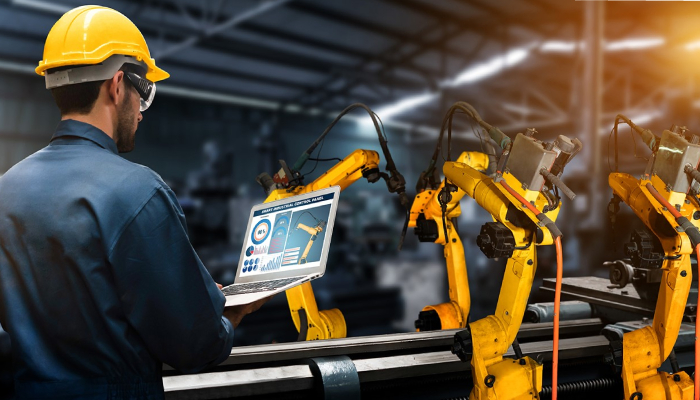With large scale digital transformation programs becoming more prevalent, the manufacturing industry continues to ride the wave with a growing focus on product development, improving efficiencies, and driving new business models and customer experiences. As per a report from Deloitte, digital transformation is a top strategic priority for 94% of executives in industrial products and services companies.
Traditionally manufacturing organizations have been managing numerous applications and systems across different business units while largely working in silos. It has become crucial to evaluate the landscape in terms of modernization, driving a move to the cloud while investing in data and analytics platforms. Essentially, the end goal is to identify areas of digital value creation through data driven insights, automation, and process optimizations. As a result, we have found that businesses are continuing to invest in digital transformation initiatives but will increasingly look for actionable roadmaps which can deliver results incrementally.
As we begin 2024, there is a lot of traction building in the industrial and manufacturing segments and I foresee 5 major trends that will continue to shape the ever evolving landscape –
- Rise of Industry 5.0 – complementing the initiatives of Industry 4.0
While Industry 4.0 focused on connecting machines and systems, Industry 5.0 will augment the organization journey with a sharp focus on areas like worker empowerment that would cover human-machine interaction, upskilling of workers, and enablement with digital devices & automation. Sustainability initiatives would also be prioritized with a focus on minimizing waste, reducing environmental impact, alternate energy sources and electrification. Finally, there will be increased focus on enhancing customer experience with greater personalization and new product development.
Organizations will continue to focus on Industry 4.0 initiatives based on their maturity and innovation quotient and I see growing investments flowing in towards Industry 5.0 to further augment ongoing programs.
- Progression of Industrial Metaverse
Increased adoption of IOT devices and 5G in Smart Factories is enabling large, real time data collection and monitoring, improvement of productivity, and reduction of down-time. The manufacturing sector is expected to demand more 5G IoT devices than any other sector. Edge computing will remain center stage and accelerate innovation and provide timely data analysis. In 2024, we expect more use cases for AI workloads closer to the source – along with data, image, video, and speech applications.
Digital Twins are enabling transformation of industrial processes and the merging of physical and digital worlds. This will promote visualization and simulation of both machines and processes – to provide visibility and optimize production processes, improve utilization and throughput. Simulations based on performance data and alternate scenarios will help predict impacted behavior and future performance. In 2024, Digital Twins are expected to play a much more impactful role in optimizing production processes.
Manufacturing organizations are increasingly moving from equipment sales to ‘Equipment as a Service’ model and after-market services will become a strong differentiator. Products are now enhanced with IoT sensors, ML capabilities and can provide valuable insights about usage of products, health, among others and will provide improved customer experiences, unlock upselling and cross selling opportunities, and open new revenue-generation opportunities.
- Widening Reach of Artificial Intelligence
With increasing data that is collected by organizations, it is critical to identify the business outcomes across the value chain and have algorithms enable the same. Use cases of predictive maintenance has greatly matured and are directly contributing towards greater utilization and improved performance of assets. IDC Manufacturing research shows that predictive maintenance plans can cut expenses up to 20% while boosting asset availability by 20%.
Automated demand forecasting and inventory management are some of the areas where advanced analytics will play a crucial role to amplify visibility and growth across the supply chain. AI-enabled visual inspection for product quality is streamlining new product development. Customer 360 and product recommendations are helping build hyper-personalized customer experience and engagement. Organizations are already beginning to see ROI for their AI investments in these areas, while new use cases are evolving continuously as organizations strive to drive disruption and stand tall as leaders and disruptors.
- March towards Sustainability
Manufacturing Organizations will increasingly look to develop new solutions and systems for managing sustainability goals. Initiatives around waste reduction, energy management, alternate fuels & materials and lower carbon emissions will attract greater interest and investments while circular economy will become more prominent to ensure safe recycle and reuse.
- Exploring the Promised land of Generative AI
Manufacturing organizations are experimenting with Generative AI use cases around information support, chatbots for customer service, product design & development. With all the hype surrounding it, there is also cautiousness in the approach as manufacturing processes are quite complex and potentially impact an entire ecosystem of partners and machinery & equipment.
Organizations are actively investing in in-house talent, while they work with partners for evaluation of use cases and platform engineering. Emergence of more powerful models, enabling content generation across text, images, audio, and video will unlock new possibilities and promote quicker movement from Proofs of Value (POVs) to real-world use cases.
In conclusion, the Manufacturing Industry in 2024 will be characterized by continued advancements in technology, increased automation, productivity improvements, commitment to sustainability goals and greater emphasis on addressing evolving customer needs. This will foster a more agile, sustainable, and technologically advanced future for the industry.


